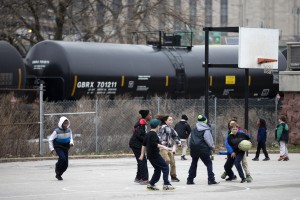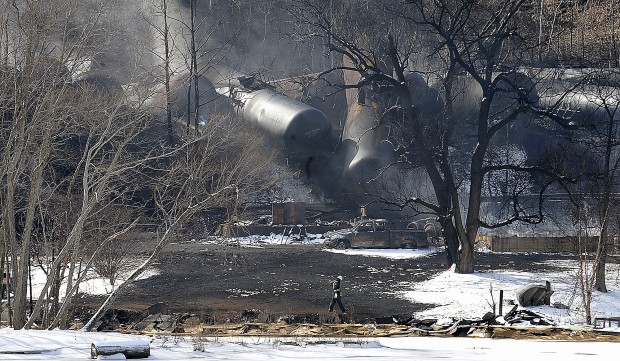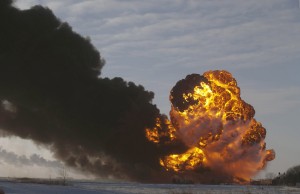Feds issue new oil train safety rules
-
Susan Phillips

Matt Rourke / AP Photo
In this photo taken April 9, 2015, children play in view of train tank cars with placards indicating petroleum crude oil standing idle on the tracks, in Philadelphia.
The Department of Transportation joined with Canadian officials Friday to announce stronger safety rules for shipping crude by rail. About 70 to 80 trains carrying more than a million gallons of crude oil from the Bakken Shale fields in North Dakota travel across Pennsylvania each week, heading to Philadelphia area refineries. The long-awaited rules come on the heels of a number of dangerous oil train derailments in both countries.
So far Pennsylvania has been lucky. Four crude oil trains have derailed in the state since January 2014. But none exploded into giant fireballs like the recent incidents in West Virginia, Illinois and Canada. in one case, an accident in Westmoreland County resulted in a crude oil spill.
New rules aimed at preventing those accidents include phasing out the current tank cars, implementing stronger tank car standards and requiring better braking systems.
Sarah Feinberg, acting administrator for the Federal Railroad Administration, told StateImpact that “stronger, better tank cars are on the way.”
“Some of the tank cars that are out there today, I think everyone would agree, are not strong enough to survive a derailment or an incident the way we would like them to,” said Feinberg. “So the good news is we’ve now landed on a new tank car standard. And so safer tank cars will be used in the transportation of this crude and also frankly with ethanol as well.”
The tank cars that currently ship Bakken crude across Pennsylvania are carried in two different tanker models; the DOT-111 and the CPC-1232. The CPC-1232 is considered an upgrade to the DOT-111, built to standards designed by the industry. But use of the 1232 model didn’t prevent an explosion at the site of the the Illinois derailment in March.
The newly built cars will have a thicker shell, and upgrades to prevent leaks and fires in the event of a derailment. The current tank cars will have to be completely replaced within the next five years.
Senator Bob Casey, who has been pushing the Obama Administration to improve oil train safety said it’s a good step, but just a step.
“It’s one of those issues that has arisen as a relatively new challenge,” Casey told StateImpact. “We have a lot more crude oil being shipped across the country and you need both legislation and regulation.”
Casey has introduced a package of legislation to reduce the safety risks of crude by rail shipments, including more funds for inspections.

Chris Tilley / AP Photo
This Feb. 17, 2015 file photo shows a crew member walking near the scene of a train derailment near Mount Carbon, W.Va.
With almost half of the Bakken rail shipments traveling across Pennsylvania, Governor Tom Wolf has also focused on oil trains, and recently hired rail expert Allan Zarembski to evaluate the state’s freight rail lines and suggest improvements.
“It’s a good series of improvements for the tank cars,” said Zarembski, director of the railroad engineering and safety program at the University of Delaware.”
Zarembski said three ingredients are necessary for a train derailment to turn into a fireball. First, there needs to be the derailment itself, second a puncture or rupture of the tank cars, and third, a heat source that would ignite the volatile liquids.
“[The new tank car standards] very much address the risk of rupture,” said Zarembski. “And all the research i’ve seen indicates that they will reduce the probability of a rupture so they’re going to do what you want to do, reduce risk.”
Zarembski says what the new rules don’t address is the volatility of the Bakken crude oil.
“There seem to be a number of studies that suggest the Bakken crude is more volatile and maybe some kind of pretreatment can prevent a fire,” said Zarembski.
Environmental groups that have begun to focus on the dangers of oil train transportation criticized the rules as “business as usual.”
“It’s essential that the federal government make oil trains safer and the modest gains made through the new tank car rules are important but they don’t make transporting crude by rail safe for communities or the environment,” said Tracy Carluccio, Deputy Director, Delaware Riverkeeper Network.

Bruce Crummy / AP Photo
In this Dec. 30, 2013 file photo, a fireball goes up at the site of an oil train derailment in Casselton, N.D. On Tuesday, March 31, 2015, Bryan Thompson, of Fargo, N.D., the engineer of the oil tanker train involved in the derailment, filed a complaint against BNSF Railway, accusing the railroad of negligence. Thompson says BNSF failed to properly inspect and maintain its equipment and failed to warn him of the dangers of hauling explosive oil tank railcars
Carluccio criticized the time-line for the tank car replacement, which under the new rules give industry five years to replace all the current tankers transporting crude oil. Carluccio also says the 40 mile per hour speed limits in urban areas should be even lower, given many of the derailments occurred at speeds under 40 mph.
“We need sweeping change and we need it now, before we suffer a catastrophe here in the Philadelphia and Delaware River region,” she said.
PennEnvironment executive director David Masur also dismissed the new rules as “bandaid” solutions.
“The threat of oil trains does not have a silver bullet solution to it,” said Masur. “The federal government needs to take a more holistic approach.”
The American Association of Railroads and the major carriers in Pennsylvania CSX and Norfolk Southern, support the new standards for tank cars, but oppose the use of electronic, pneumatic brakes, saying the benefits are not proven, and would hamper freight transport. In a statement, Norfolk Southern said although the company uses some electronic brake systems, the benefits of the rule may not outweigh the consequences.
“With respect to the ECP brakes, NS has been experimenting with ECP brakes on a small number of coal trains since 2007, but it is not widely used on our system. We stand with the AAR and question the benefits and consequences of this rule. We will evaluate the new ECP rule to determine how it will impact our operations and work with the owners of the tank cars to determine the best way forward.”
CSX released a statement that said using these brakes “could dramatically and widely slow railroad operations and impair railroads’ ability to serve customers in all sectors of a growing economy.”
University of Delaware researcher Allan Zarembski says he doesn’t see a lot of added value to the new braking system.
“To me that is not as powerful a benefit as improving the structural strength of the tank cars,” he said.
But FRA Administrator Sarah Feinberg says requiring the new braking system will be a “game changer” for rail safety.
“I know the railroads aren’t particularly happy about the costs of that system but at the end of the day we think that safety is more important than cost,” said Feinberg.
Transporting crude by rail has impacts beyond the oil itself. A recent report by the Department of Energy pointed to issues with transporting food and agricultural products now that the rail lines are clogged with oil trains. Zarembski says safety needs to be balanced with the movement of goods across the country
“At this point in time, a lot of what we’re doing is incremental,” said Zarembski. “And so the question becomes how much further can we go without seriously disrupting the operations of the railways to the point where we lose capacity and the ability to operate effectively, which would hurt us in other ways.”
















